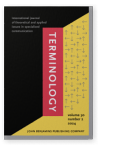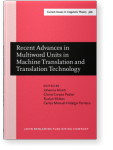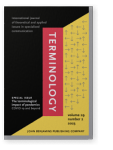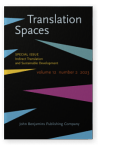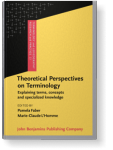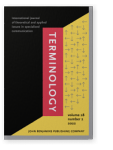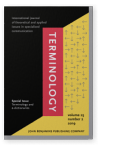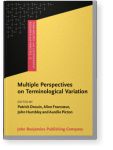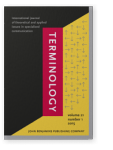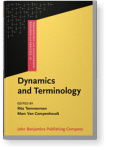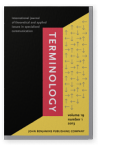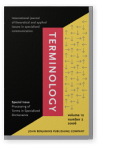Pilar León-Araúz
List of John Benjamins publications for which Pilar León-Araúz plays a role.
Journal
2024 Chapter 5. Evaluating a bracketing protocol for multiword terms Recent Advances in Multiword Units in Machine Translation and Translation Technology, Monti, Johanna, Gloria Corpas Pastor, Ruslan Mitkov and Carlos Manuel Hidalgo-Ternero (eds.), pp. 79–102 | Chapter
Multiword terms (MWTs) are frequently used to encapsulate and convey meaning in scientific and technical texts. However, they can also make these texts difficult to understand because the relations between constituents are not transparent. When MWTs have more than two constituents, a dependency… read more
2023 Denominative variation in the COVID-19 Open Research Dataset corpus The terminological impact of pandemics: COVID-19 and beyond, Wermuth, Maria-Cornelia and Paul Sambre (eds.), pp. 252–305 | Article
Since 2020, we have witnessed the emergence of new concepts and terms due to the pandemic outbreak. Some of them have even become obsolete in a short period of time whereas others are still misused despite standardization efforts. In this paper we study explicit denominative variation in the… read more
2023 Indirect translation and its influence on term variation: A pilot study on climate action Indirect Translation and Sustainable Development, Buts, Jan, Hanna Pięta, Laura Ivaska and James Hadley (eds.), pp. 255–284 | Article
Term variation occurs when different designations are used to name the same concept. In institutional settings, such as the European Union, term variants multiply, partly as a result of the different languages and directions involved. Indirect translation is a recurrent practice in these… read more
2023 Corpus-driven conceptual analysis of epidemic and coronavirus for the Humanitarian Encyclopedia: A case study The terminological impact of pandemics: COVID-19 and beyond, Wermuth, Maria-Cornelia and Paul Sambre (eds.), pp. 180–223 | Article
Terminological conceptual analysis can be applied to purposes beyond terminology work. This article presents a Frame-based Terminology approach adapted to analyse concepts and inform the content of entries in the Humanitarian Encyclopedia. It proposes a method for conceptual analysis by… read more
2022 Chapter 22. Terminology and equivalence Theoretical Perspectives on Terminology: Explaining terms, concepts and specialized knowledge, Faber, Pamela and Marie-Claude L'Homme (eds.), pp. 477–502 | Chapter
Equivalence has not attracted as much interest as other issues in Terminology. Nevertheless, terminological equivalence can be understood from different perspectives: (1) equivalence at the concept, term or textual level; (2) degree of equivalence (from full to zero equivalence); (3)… read more
2022 Repérage automatisé de l’hyponymie dans des corpus spécialisés en français à l’aide de Sketch Engine Terminology 28:2, pp. 264–298 | Article
Hyponymy is an essential semantic relation in terminology, as it represents the hierarchical organization of concepts. Much has been written about hyponymy extraction. However, terminologists working with French do not currently have user-friendly and freely available tools to automatically… read more
2019 EcoLexicon and by-products: Integrating and reusing terminological resources Terminology and e-dictionaries, Alcina, Amparo, Rute Costa and Christophe Roche (eds.), pp. 222–258 | Article
Reutilization and interoperability are major issues in the fields of knowledge representation and extraction, as reflected in initiatives such as the Semantic Web and the Linked Open Data Cloud. This paper shows how terminological resources can be integrated and reused within different types of… read more
2017 Chapter 9. Term and concept variation in specialized knowledge dynamics Multiple Perspectives on Terminological Variation, Drouin, Patrick, Aline Francœur, John Humbley and Aurélie Picton (eds.), pp. 213–258 | Chapter
Variation is a relatively new area of study in Terminology, as traditional approaches initially relied on the univocity principle and represented concepts in static universal structures. This means that for a long time, neither term nor concept variations were regarded as important and were largely… read more
2014 7. Specialized knowledge dynamics: From cognition to culture-bound terminology Dynamics and Terminology: An interdisciplinary perspective on monolingual and multilingual culture-bound communication, Temmerman, Rita and Marc Van Campenhoudt (eds.), pp. 135–158 | Article
This chapter examines the multidimensional representation of specialized concepts and concept systems within the context of new theories of simulated cognition and culture-bound terminology. According to the premises of Frame-based Terminology (Faber et al. 2005; Faber et al. 2006; Faber et al.… read more
2013 Dynamism and context in specialized knowledge Terminology 19:1, pp. 31–61 | Article
EcoLexicon is a terminological knowledge base (TKB) on the environment which seeks to enhance both cognitive and communicative needs of different users. In order to achieve this, TKBs should reflect conceptual structures in a similar way to how concepts relate in the human mind (Meyer et al. 1992).… read more
2006 Process-oriented terminology management in the domain of Coastal Engineering Processing of Terms in Specialized Dictionaries: New Models and Techniques, L'Homme, Marie-Claude (ed.), pp. 189–213 | Article
This article describes the theoretical premises and methodology presently being used in the development of the PuertoTerm database on Coastal Engineering. In our project there are three foci, which are highly relevant to the elaboration of lexicographic and terminological products: (1) the… read more
